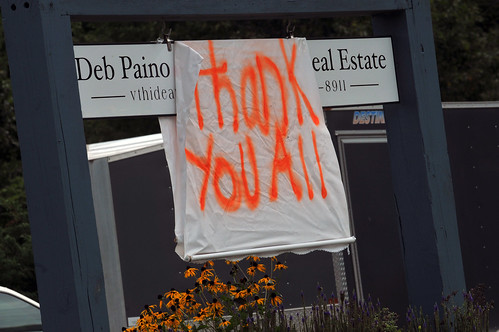The Aftermath
/ This past weekend, I was able to volunteer in both Waterbury and Moretown, two towns that are struggling with the floods. The aftermath was heartbreaking. My hometown was inundated with upwards of 7 feet of flood waters in places, and many other communities around the state were under water, with roads flooded, houses swept away, and businesses destroyed.
This past weekend, I was able to volunteer in both Waterbury and Moretown, two towns that are struggling with the floods. The aftermath was heartbreaking. My hometown was inundated with upwards of 7 feet of flood waters in places, and many other communities around the state were under water, with roads flooded, houses swept away, and businesses destroyed.
On Saturday, I drove a group of Norwich University students out to Waterbury, where they worked on one of the streets hardest hit by the rising waters, which took out a number of places in the downtown areas of town, including one of my favorite Pubs, the Alchemist, and a number of state administrative buildings. While I'd seen a number of pictures, videos and driven up and down several roads up and down the Northfield area, nothing prepared me for what I saw in Waterbury: houses with their entire contents in the front lawn, silt baking on their surfaces. Mud and dust filled the air: everyone wore a mask, gloves, heavy boots, and clothes smeared with grime. The scene changed as I drove back out of the village, and onto the interstate: everything was green and untouched.
Sunday marked a work day. I'd driven through the day before, over patched up dirt roads, and into town. The scene was even more striking. Descending into the village, we passed a sign: "All routes in and out of town closed." Moretown was covered in a fine layer of dust, kicked up from the cars that passed up and down Rt. 100 B. Driving through town, we saw where the bridge into town had been washed out at one end, over a narrow chasm of rock that was still saw the Mad River rushing below it. Megan and I signed in, and helped wash one man's house before moving on to another, which had seen a couple of feet of water in the main parts of the house. Tearing up the floorboards, I was struck by two things: no matter how secure we see, nature can really disrupt our everyday lives, and that I was tearing up a gorgeous hardwood floor, and the home's owner was smiling. It was astonishing.
A pack of volunteers had converged on the house: groups of two were pulling up the floor, sweeping up the dust and river muck that had collected under it, and pulled out the nails. Bathroom tiles shattered, sheetrock was removed, pipes stripped out, as we sweated in the dust. It was a rewarding couple of hours of work: by the end of the couple of hours, the floor had been removed, swept and free of nails, while others outside were salvaging what they could of the wood we pulled up and out. Fortunately, they seem to have had flood insurance.
The attitude of Vermonters in the aftermath of the flood has been the most remarkable thing to have come out of the disaster. Everywhere, people were enthusiastic, ready to work, ready to volunteer, and ready to rebuild. Despite the dust, the mud, the destroyed roads, washed out riverbanks, bridges and fields, the people of Vermont have shown that they’re resilient, tough and as a whole, strong. While disasters such as these are horrifying in the damage, they’re welcome in only that they can demonstrate the unity that they invoke from the community. Their roads and homes might be broken, but not the people.
